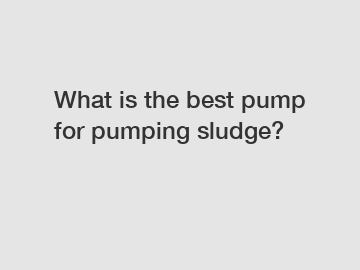What is the best pump for pumping sludge?
When it comes to pumping sludge, selecting the right pump is crucial. Sludge is a challenging material to handle, as it is thick, viscous, and often contains solid particles. Choosing the best pump for pumping sludge can make a significant difference in terms of efficiency, performance, and overall success of the process.
There are several types of pumps available on the market that are specifically designed for handling sludge. Some of the common types include progressive cavity pumps, diaphragm pumps, peristaltic pumps, and centrifugal pumps. Each pump has its own set of advantages and disadvantages, and the best choice will depend on the specific requirements of the application.
One of the most popular types of pumps for pumping sludge is the progressive cavity pump. These pumps are known for their ability to handle high viscosity fluids, making them ideal for pumping sludge. Progressive cavity pumps work by using a rotor that rotates inside a stationary stator, creating a series of small chambers that move the sludge through the pump. This design allows progressive cavity pumps to handle viscous materials with ease, making them a top choice for sludge pumping applications.

Another option for pumping sludge is a diaphragm pump. Diaphragm pumps use a flexible diaphragm to create suction and discharge pressure, making them suitable for handling thick and abrasive slurries. Diaphragm pumps are often used in applications where cleanliness and leak-free operation are critical, as they can provide a tight seal and prevent contamination.
Peristaltic pumps are also a popular choice for pumping sludge. These pumps work by squeezing a flexible tube to move the sludge through the pump. Peristaltic pumps are known for their gentle pumping action, making them ideal for handling fragile solids and shear-sensitive materials. They are also easy to maintain and clean, making them a convenient option for sludge pumping applications.
Centrifugal pumps are another common choice for pumping sludge. These pumps use centrifugal force to move the sludge through the pump, making them suitable for applications where high flow rates are required. Centrifugal pumps are known for their simple design and high efficiency, making them a cost-effective option for sludge pumping.
When selecting the best pump for pumping sludge, it is important to consider the specific requirements of the application. Factors such as the viscosity of the sludge, the size of solid particles present, the flow rate needed, and the distance over which the sludge needs to be pumped should all be taken into account. Consulting with a pump expert can help ensure that the right pump is chosen for the job.
In addition to selecting the right type of pump, it is also important to ensure that the pump is properly sized and installed for optimal performance. This includes selecting the right pump size, ensuring that the pump is compatible with the sludge being pumped, and following proper installation procedures. Regular maintenance and monitoring of the pump are also essential to ensure that it continues to operate efficiently and effectively.
In conclusion, the best pump for pumping sludge will depend on the specific requirements of the application. Progressive cavity pumps, diaphragm pumps, peristaltic pumps, and centrifugal pumps are all viable options for handling sludge, each with its own set of advantages and disadvantages. By carefully considering the requirements of the application and consulting with a pump expert, you can select the best pump for pumping sludge and ensure successful and efficient operation.
For more Expeller Seal Slurry Pumps, 8/6E-HS Slurry Pump, Sand and Gravel Pump Rangeinformation, please contact us. We will provide professional answers.
194
0
0

Comments
All Comments (0)